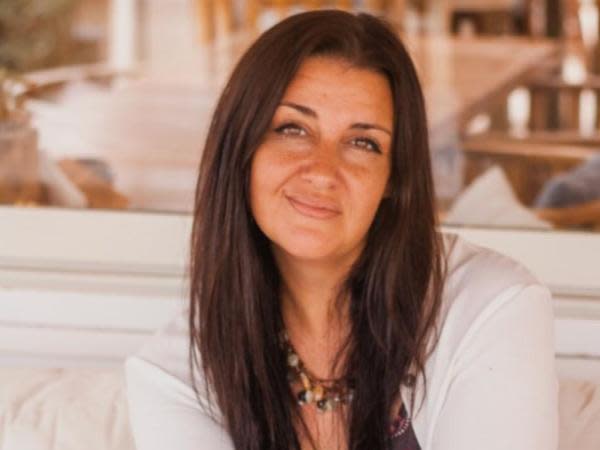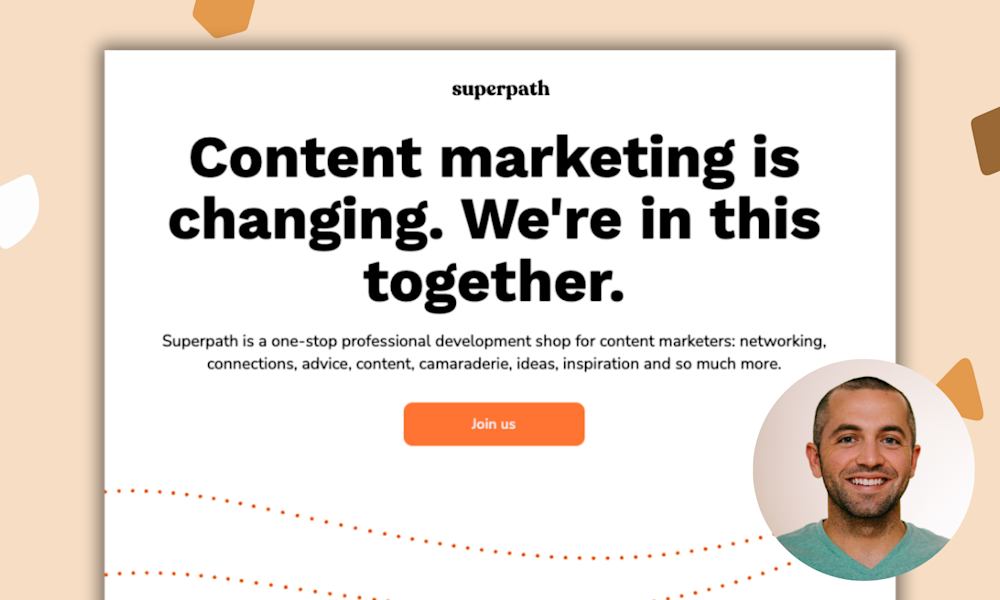What would happen if you let go of the ‘shoulds’ and started trusting your instincts?
For mindset coach Becky Mollenkamp, choosing to stop living a life of ‘shoulds’ changed everything — including her career.
Becky helps people make the shift from “small business owner” to CEO and create sustainable businesses without burning out. Through her Gutsy Boss brand, she has helped thousands of clients release their own ‘shoulds’ and define success on their terms.
She brings nearly 20 years of experience as an entrepreneur to her work, including owning a six-figure content marketing agency before starting her coaching business in 2015.
She was also our first ever Podia creator story, all the way back in 2018.
We recently checked in with Becky to hear how her business has evolved over the last few years and reflect on her creator journey. Her business is currently in a transition period, as she hones in on working specifically with midsize business owners and their consultants and employees.
Keep reading to learn how Becky has grown her business by trusting her instincts and letting go of the ‘shoulds’ — and is helping fellow business owners do the same.
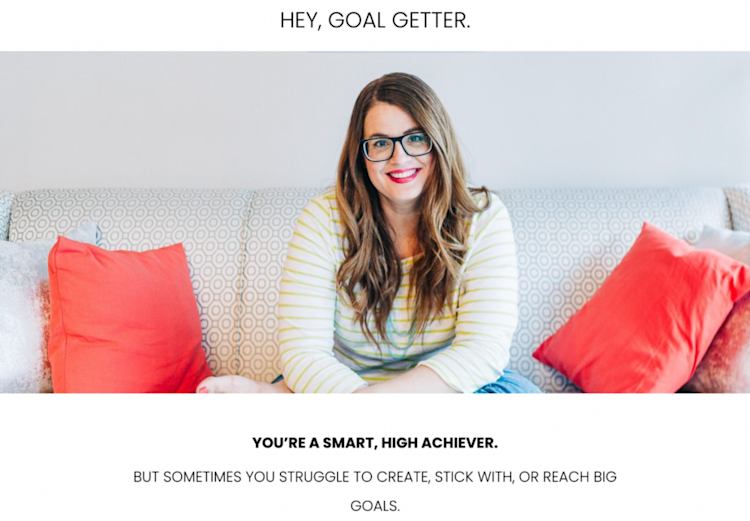
Finding her calling as a mindset coach
Though Becky has been an entrepreneur for nearly two decades, coaching wasn’t always a part of her plan.
“What started me down the coaching path was my brother died in 2010 of a heroin overdose. It really shook me out of my slumber,” Becky explains.
“I was living a life of ‘shoulds’, going through the motions, doing all the things that a good girl’s supposed to do. That helped me realize life’s way too short to live a life that isn’t what you actually want.”
“I didn’t know what I wanted. I just knew it wasn’t that,” Becky remembers. She shut down her writing business and moved back home with her mom. Then came the internal work of figuring out what she did want her life to look like.
Becky began to rebuild her writing business. “It was what I knew and what I was good at. But I realized what I actually wanted to do was help other people break free of the ‘shoulds’.”
So she started coaching.
"I realized I could help people with the same stuff that I’ve been through. And that’s really where I found this is what I’m meant to do. It’s my calling."
Her own work as an agency owner and newfound drive to help others made Becky’s unique perspective a perfect match for mindset coaching.
“I’m not a strategist or a consultant, but actually a coach. So I help people come to their own answers and their own understanding about what they want from their life or their business, and then help them move forward on that,” Becky explains.
In line with helping others live their values more fully, she brings her own principles to the work. “I’m a feminist coach, which means that I honor lived experience, that I’m trauma-informed, that my coaching is all about compassion, no blaming and shaming.”
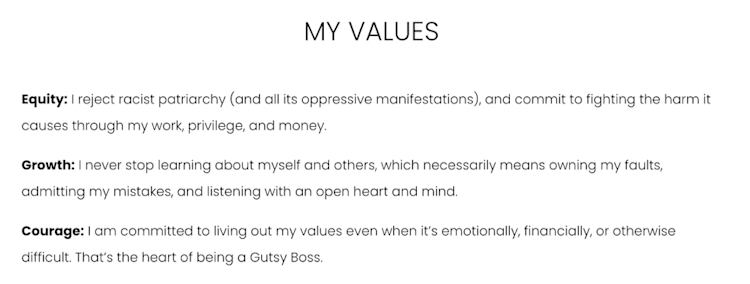
Armed with experience and inspiration, Becky began building her online coaching business — but that came with plenty of ‘shoulds’, too.
Tuning out the noise about what an online business should look like
When asked about the challenges of building her coaching business, Becky laughs. “There were no challenges I didn’t have. I feel like I had all the challenges.”
The battle of the ‘shoulds’ played out here, too. “I would say the biggest challenge was all of the noise in the online space about how a business should look, how you have to run it, the things you need to do to be successful,” she says.
Looking back, Becky finds this common misconception—that business owners who don’t go all-in from day one don’t believe in themselves—harmful and privileged. “I didn’t know that at the time, and I had a lot of guilt and feeling like I wasn’t doing a good job because I still had to write [to make ends meet].”
She remembers thinking, “Why couldn’t I make the coaching thing more successful more quickly? What was wrong with me?”
The truth is, most people can’t afford to jump right into a new business full-time — and that’s okay! It can be a gradual process, and that doesn’t mean you’re less dedicated or valid as an entrepreneur.
"I had to do my own work to release myself from all of that blame and shame and realize that advice [to go all-in] was not realistic for most people."
"The biggest challenge at first was recognizing that I could gradually shift from a writing business to a new business.” She focused on shifting her work by 25% each year. The first year was 75% writing and 25% coaching. “Honestly, this is the first year that’s 0% writing,” Becky tells us.
“That was a slow transition. Allowing that and then releasing the shame about that, to know that it’s okay, might be the smartest and best way for people to start a new business, instead of feeling like they have to go all in or they just don’t believe in themselves.”
Becky also struggled to treat herself as the CEO; to see the value in her work and think big picture.
“You can be a freelancer, you can be a solo entrepreneur, you can be a small business owner with just a few consultants. But you are still the head, you are the CEO, you are the visionary," she emphasizes.
"It's about the confidence of showing up and saying, 'I know my stuff. I can do this.'"
Today, the CEO mindset is a central theme of her work with clients.
Targeting a more specific client (while still serving her broader audience)
Becky’s work is in a transition period: She’s narrowing her focus to coaching midsize business owners and their teams.
There are a few reasons for this change:
-
It aligns her work even more closely with her own learnings and experiences as a business owner.
-
Offering her time as a service makes Becky the most money.
-
It’s the work she enjoys the most.
Based on her own journey, Becky wants her clients to experience “the shift that it makes internally when you start treating your business like a business and treating yourself like a CEO.”
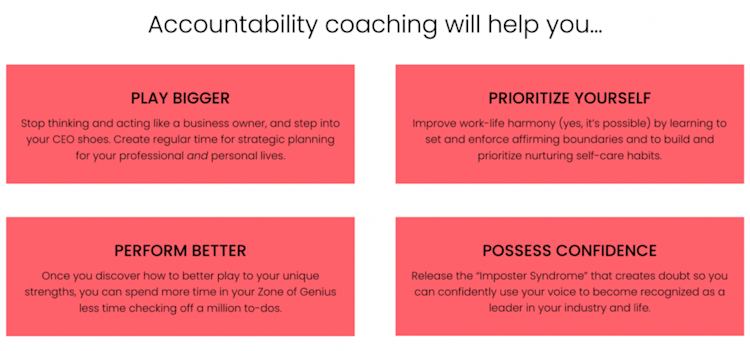
“I have been working with individuals, and I still do, but I’m moving towards working more with people, generally women, who own midsize businesses,” she describes. “It’s about work-life harmony for them and then also working with their employees or consultants to give them coaching so that they can also create better work-life harmony.”
This shift will make a difference for Becky’s bottom line, too.
“You charge more [for coaching], so you only need to get one person to make the same amount of money from those $7 guides or even a $200 course. I have to sell a lot more [courses and guides], which means I have to have a lot more people on my list because only a percentage of people convert into things.” Coaching clients tend to refer others, which means even more potential coaching revenue down the line.
That said, Becky plans to continue serving her broader audience, even if they aren’t the right fit for her new one-on-one coaching.
“I’m still holding onto my business as I’ve done it, which is Gutsy Boss, and helping individuals as well as businesses,” Becky explains. “I don’t want to leave those other people behind. I’ve been working with individuals for a long time, and a lot of them listen to my podcast, or they’re on my email list.”
With those individuals in mind, Becky has repurposed a lot of her existing content into Gutsy Guides that help tackle individual issues, like boundary-setting, making big asks, and overcoming imposter syndrome.
“Generally, those [individuals] are mid-career professionals, and rather than doing a lot of one-on-one with them, I provide a vault of resources that they can use to self-coach around those things,” she says.
Now, when someone discovers Becky’s work, they fit into one of two segments:
-
Potential coaching clients
-
Individuals who can benefit from Becky’s self-guided mini-course, self-study program, and Gutsy Guides, all hosted on Podia
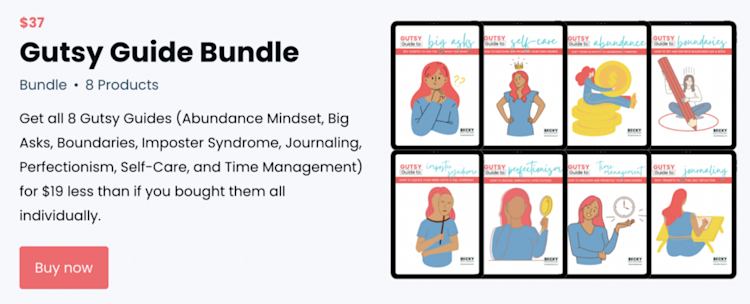
How does she figure out which segment each potential client fits into?
With automation, segmentation, and some inspiration from The Golden Girls.
Using automation, segmentation, and a fun quiz to match potential clients with the right products
Becky has a quiz on her website: “Which business owner are you?” The six-question quiz (built with Interact) tells visitors which Golden Girls-inspired business owner personas they match: Newbie (Rose), Flirt (Blanche), Pro (Dorothy), or Sage (Sophia).
Each persona represents a different stage of business ownership, from first steps to experienced professional.
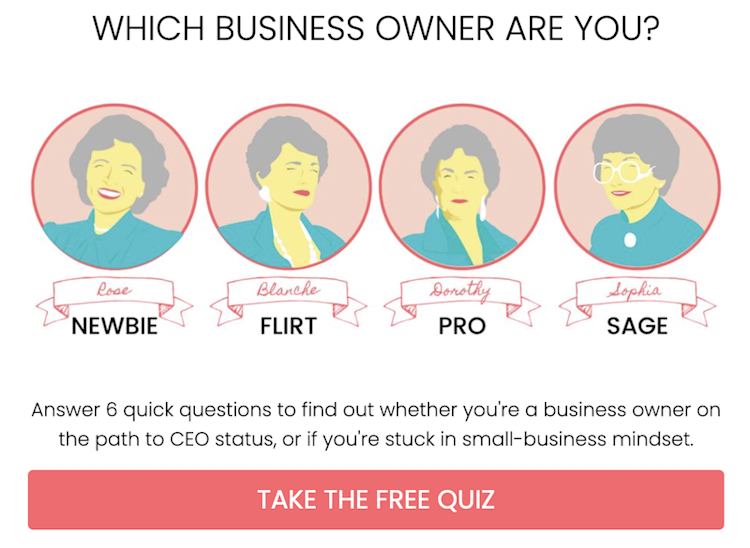
At the end of the quiz, Becky gives respondents the option to enter their email address in exchange for “tips on how to be a Gutsy Boss.” When someone signs up, Becky segments them based on their quiz results, then sends them a series of emails highlighting the products that best match their needs. Someone with a Newbie quiz result might learn more about the Gutsy Guides digital downloads, while a Pro or Sage will be a better fit for Becky’s one-on-one mindset coaching.
“To be clear, this is a more advanced email opt-in,” Becky cautions fellow creators. “I wouldn’t start with something like this if you don’t yet have an opt-in… I started with just a download. That’s the easy way to go.”
(Check out this guide to creating your first lead magnet quickly and easily.)
Once you’re ready to segment your audience, a more complex opt-in offer like Becky’s quiz can help you do so. You can use that segmentation to automatically approach them with offers tailored to their specific interests or experience levels.
She automates the email series through ConvertKit, which means she doesn’t have to spend valuable time sending the right products to the right people.
“It all happens while I’m sleeping,” she describes. “They’re getting their email series, and if they want to purchase these guides, they’re priced super affordably. So it makes it a no-brainer, and it’s a really easy system.”
Becky knows that Podia will grow with her business
As Becky’s business has evolved and changed, so has the way she uses Podia.
The Gutsy Boss brand started with a course about LinkedIn for small business owners, hosted on Podia. (You can read more about the course — and all of Becky’s early Podia products — in her original creator story.)
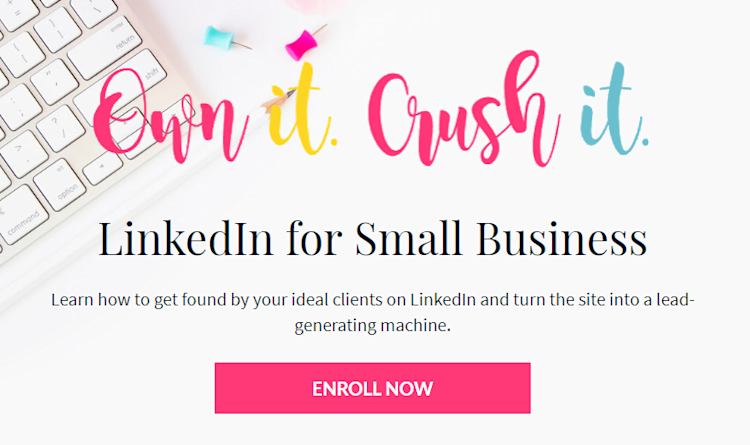
Becky added (and sometimes removed) new products as her business grew, including digital downloads, additional courses, and group coaching.
Right now, she’s gearing up for the 2023 Gutsy Accountability program, which includes group coaching, downloadable resources, 1:1 coaching with Becky, and/or live workshops, depending on the programs clients choose.
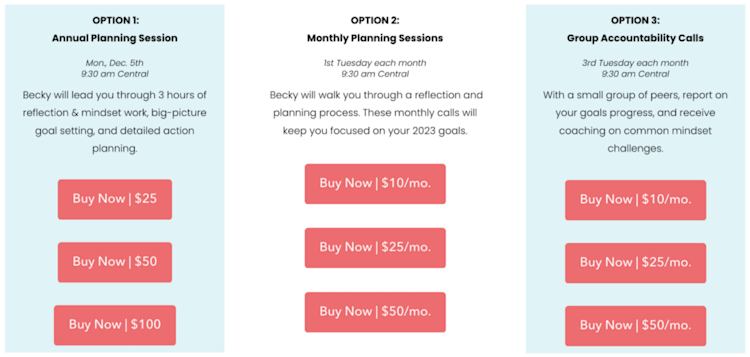
“I love being able to do group coaching using Podia because all of the assets that I want to share can be housed there. [My clients] have a place to go get them. I can make assets that I already have available to them. It really makes that less effort. And they can pay through Podia. I don’t have to worry about any of that.”
Podia’s embeddable buy buttons and checkout experience make it easy for customers to purchase programs like Gutsy Accountability without leaving the landing page.
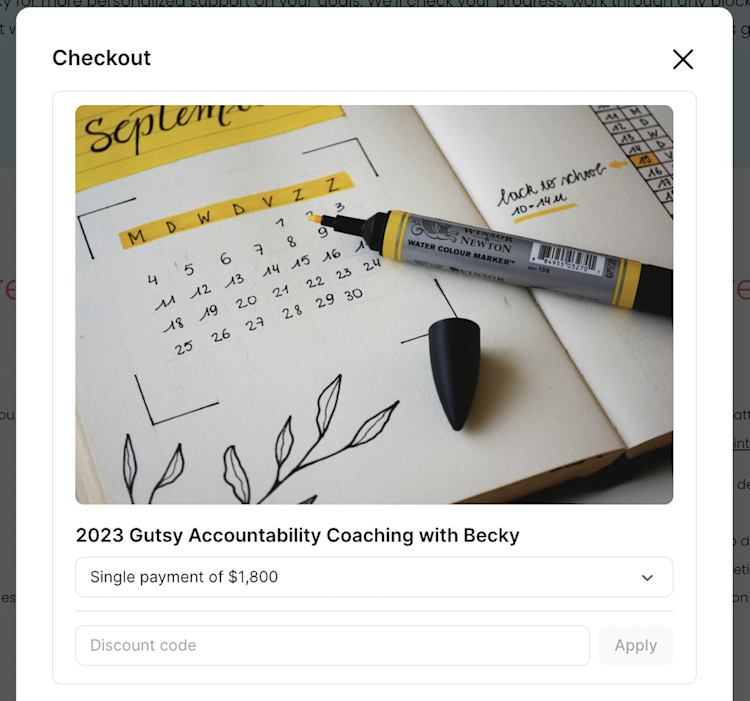
Throughout her creator journey, Podia has given Becky the flexibility to explore these different product types and find what works best for her and her clients.
“Almost every week, I have someone reach out to me and say, ‘I know you use Podia, tell me about it,’ which I’m always happy to do,” she says.
“I think it’s good for people to know you can build on this platform… You’ve got it all here for a price you can afford.”
Trust your instincts and build a business that’s true to you
Becky’s closing advice to creators is the same as she gives her clients: Trust your gut.
“Listen to your intuition. Most of the people who come to me… they have all of these doubts, and they don’t feel confident, and then that makes them feel stuck and then they feel like they’re making no progress on their business. And that’s so demoralizing. And I remember that feeling,” she says.
“In the beginning, really trying to trust yourself is important to having any kind of success.”
Becky’s coaching business has come a long way since her first course launched on Podia in 2018. But the heart and soul of her coaching — helping others let go of those ‘shoulds’ — remains steadfast. We can’t wait to see where the next four years (and beyond!) will take Becky and her business.
